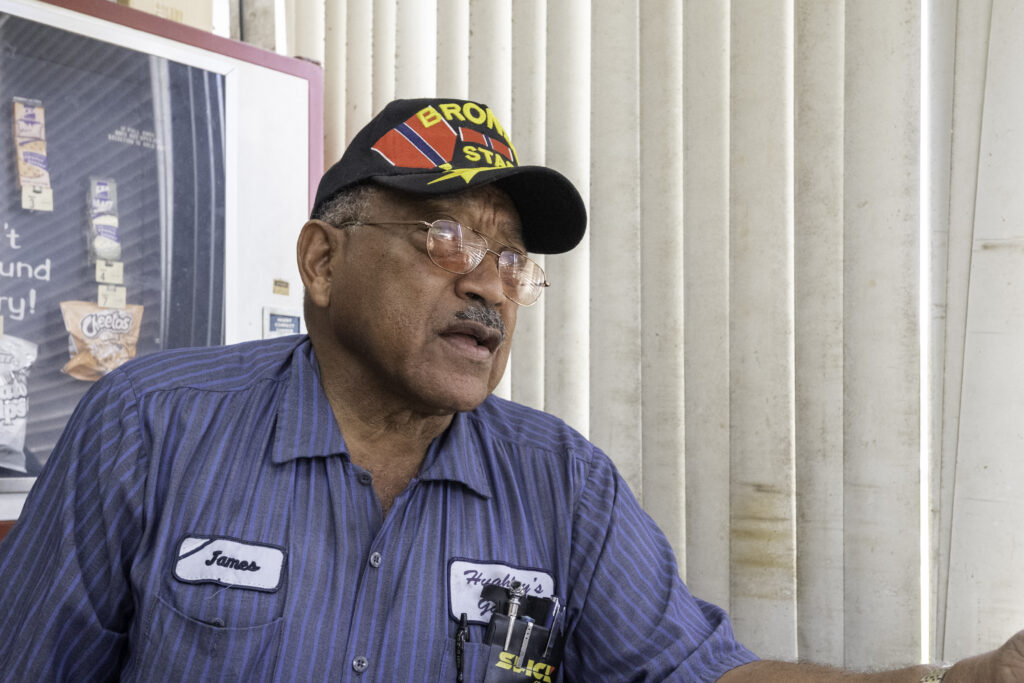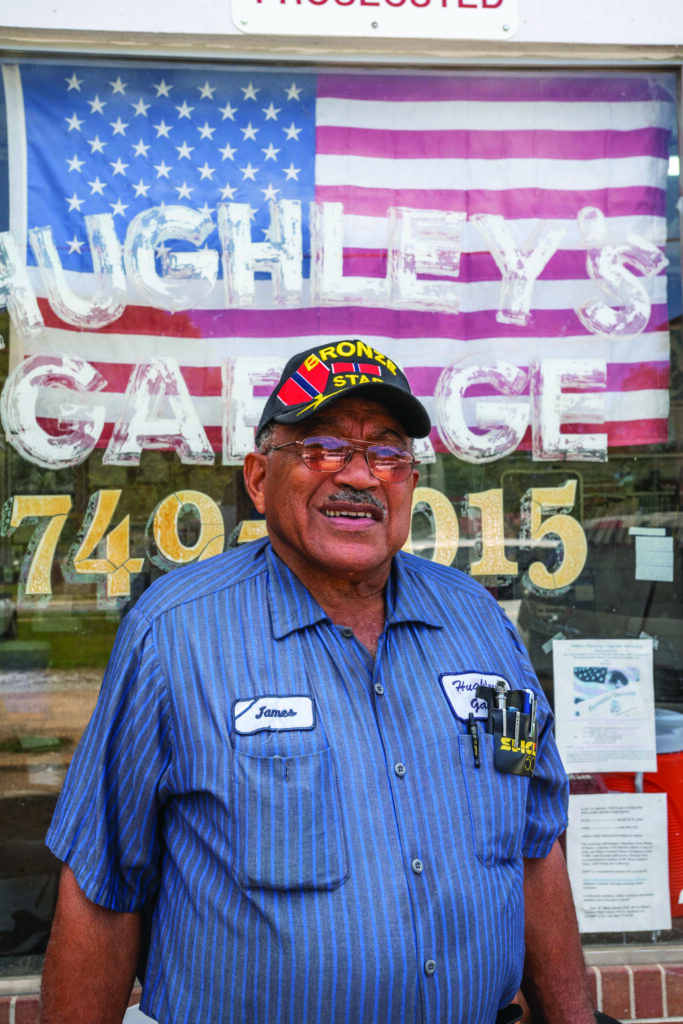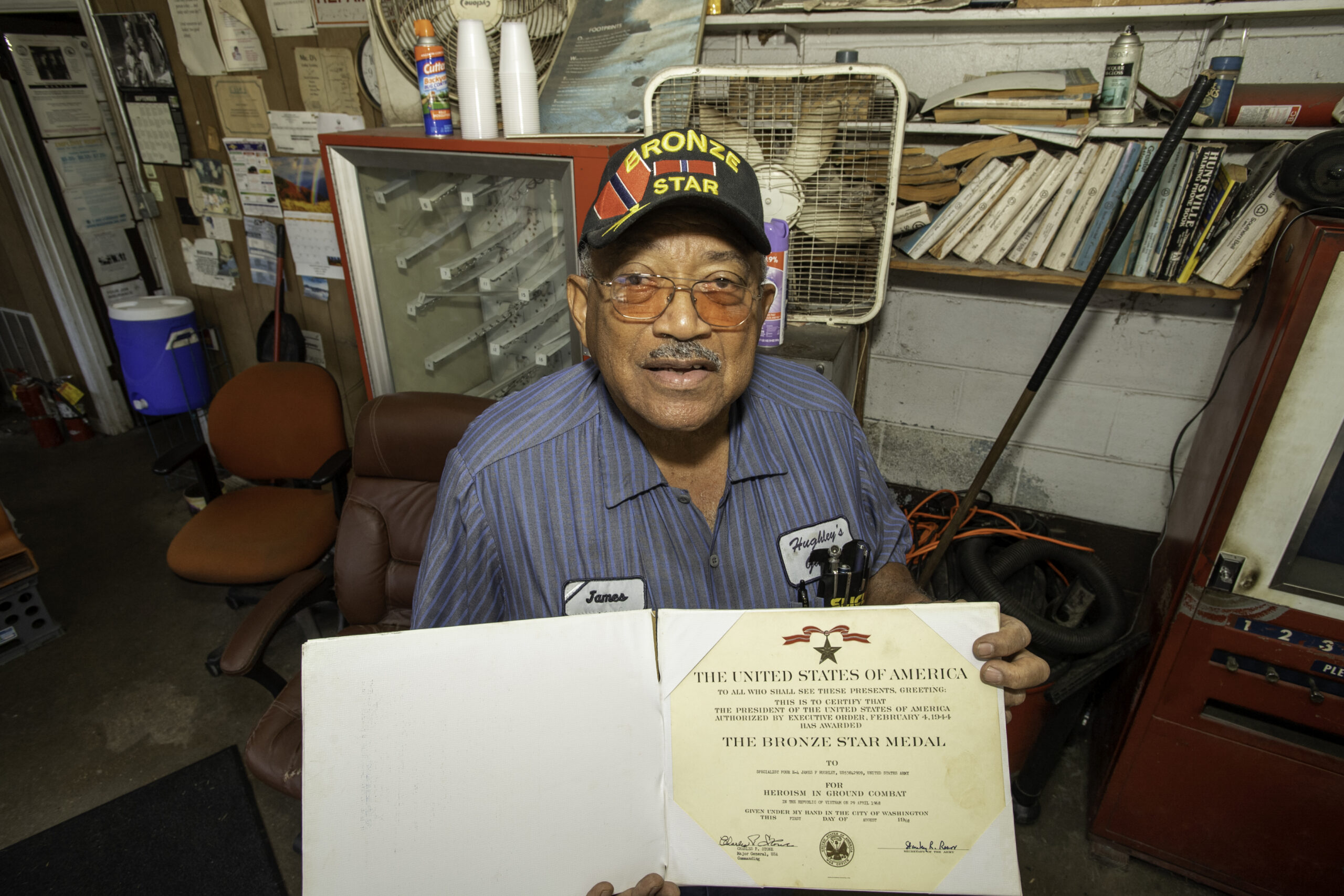Story By Wil Crews
Photos By Robert Noles
President Lyndon B. Johnson was given broad authority to increase U.S military presence in Vietnam in Aug. 1964. For the first time since America had intervened, Johnson deployed combat units and octupled American forces to 184,000. The U.S. military drafted 2.2 million young American men between 1964 and 1973, to go to war with South Vietnam to fight the North Vietnam Army, the Viet Cong and their communist allies – namely the Soviet Union and China.
James Frank Hughley, Opelika native, was one of those 2.2 million. The amorphous reasons for which the U.S. got so heavily involved in Vietnam have been heavily debated; but Hughley’s involvement – like many misjudged soldiers – was a honorable declaration to selflessness and duty.
Hughley grew up in Opelika, his life intimately integrated with the outdoors and the farm that he lived on. The future solider and his family moved into the city where he attended and graduated J.W. Darden High School when Hughley was in the eighth grade. Hughley began working at the West Point Pepperell Mill at the corner of South Ninth Street and Avenue A in Opelika after school. If he envisioned living out his youthful golden years working the typical 9-to-5; those dreams would have to wait.
Now, years later, with his weather-worn Hughley’s Garage button up, vintage Auburn Tigers ball cap and Price is Right on in the background, Hughley sat down in his office to discuss how his two years of involuntary military service changed his life.

Going to Vietnam
Hughley was drafted in 1967 at the age of 19. He recalls the day he went to the draft office.
“Miss. Margaret Sellers was head of the program,” he said as he refrained from hiding his initial contempt for the person who was in charge of shipping him off to a foreign country to risk his life.
“When we left from there, the only thing she told us was, ‘I want you boys make us proud.’” Those words stuck with him. Hughley and his classmates trailed just over 30 miles from Opelika to Cusseta, Georgia, to begin basic training at Fort Benning. From there, he traveled to Fort McClellan for advanced infantry training (AIT). There were only 18 days between AIT and shipping off for Vietnam. It took a year, but once Hughley returned home, he had a renewed perspective on Sellers and the war itself.
“I realized she had a job to do, and I had a job to do,” he said.
The Heat of Battle
There was barely time for goodbyes and no time for panic. Hughley, like most soldiers, was leaving something behind.
“I was worried,” he said. “My girlfriend was pregnant, I didn’t want to go, but I went on a leap of faith. I was praying that I came back, my mother was praying, the whole family was praying.”
Action dictates life or death in Vietnam, however. Not only did Hughley and his fellow soldiers have to cope with the enemy, it was often the environment that presented the biggest challenges.
“The climate was blistering hot,” Hughley said. “You had monsoon season. Helicopters can’t even fly because the fog around the mountains and the air would pull them into the mountain to crash. You had to worry about leaches; had to carry socks and dry powder.”
Oh, and the enemies?
“The enemy set booby traps, they ambushed a lot, you had to be aware every second,” Hughley said.
Initially, Hughley said he adapted to Vietnam rather quickly.
“Once I got over there, I fit in. You kind of pattern after someone who had been there and learned the ropes.”
He believes that his countryside upbringings helped him adjust.
“I had an advantage,” he said. “I knew the different smells because I was raised in the woods. I could look at the twigs and you can tell somebody been through there. If something didn’t look right, you can tell that’s a booby trap. They used fishing line, you have to go slow to see it but fishing line got no business in the jungle.”
Hughley rose to the rank of squad leader and soon experienced the daunting reality of battle first-hand.
“It was 12 o’clock at night when I got hit,” he said. “We were being overrun and a mortar round hit right behind my shoulder.”
Hughley said it was just like on TV where it propels the soldier back through the air.
“It felt like somebody hit me with a brick and knocked me over.”
Still, as the enemy was closing in, Hughley had no time think about himself.
“One guy in our position was killed and another wounded,” he said. “I was the squad leader so I had to tend to them.”
The fighting eventually slowed and gunships came over to secure the area for the U.S. forces.
That’s when Hughley realized: “It was raining. I could feel something dripping off my hand.”
He turned to another soldier and said, “shine the light on me.
That’s when the other soldier told Hughley, “that’s not rain, you’re bleeding bad,” – so bad in fact, that the medic wouldn’t even tell Hughley the extent of his injury.
He was offered morphine – which he bravely declined – as he was eager to help remove the dead and aide the injured.
“My other guys are down there I got to go,” he told the doctor.
But there was nothing he could do, his arm was completely numb and he wasn’t even fit to carry a rifle.
Now remember, Hughley was hit at midnight. It was nine o’clock the next night before he got to the hospital to have an operation.
“They told me I lost so much blood they couldn’t put me to sleep.” Hughley said. “They’re going through the operation and I’m lying there looking at it hearing them picking the metal out. [The doctor] said, ‘We cut all we can cut to get it out. You tell us if you want us to keep going, you may not use your shoulder again, or leave it in there it will work out through your skin.’ I told them to just leave it in there … I had to sign with my left hand.”
Over the course of his tour, Hughley was wounded twice more, once in the leg and once in the chest – an inch away from his heart. He later learned that he was supposed to be sent home earlier, but a year passed and it was finally his turn to come home.

Coming Home
For many soldiers, and Hughley alike, the relief and excitement that came with returning home quickly soured.
“When you come back, half the people didn’t like you just because you were over there,” he said. “We were spit on, called baby killers. They would say the meanest things, and you just got done fighting for them.”
But Hughley was now a war-hardened, grizzled vet; he didn’t let that get the best of him. If not anything else, he had come back in one piece.
“I felt like I had accomplished something,” he said. “It was a year of hardship but I learned a lot.”
Overall, Hughley holds his head high knowing that his time in Vietnam was spent doing the right thing – trying to keep the peace. Still, there were things that made him question the sanity of the cause.
“Our policy was so conflicted in that way,” he said. “They said you are not to fire unless you are fired on. You in a war, that don’t make sense. If you walk up to a village and you see them with a weapon, you supposed to wait until they fire at you, kill one of your man. What you supposed to do?”
That’s a question unthinkable to many of us, but a daily reality to Hughley during his time on tour. Once back in the states, he spent a year at Fort Benning, training rangers and officer candidates. He left the military two years after entering, in 1969. He settled and started working at the Uniroyal tire manufacturing plant – later changed to the BFGoodrich Tire Manufacturing plant before it closed in 2009.
Civilian Life
Thanks to his VA benefits, Hughley didn’t stay at Uniroyal for long.
“I started to prepare for a better life,” he said. “I married my girlfriend, and in 1970 I started school at Opelika Tech (now Southern Union). I graduated, and got [his garage]. I started across the street and been in this business ever since (1973).”
He now spends nearly every day Hughley Garage & Service, and when he thinks about his time in Vietnam, he said he has no regrets.
“I’m grateful for the experience. I didn’t want to go, but after coming back, I’m glad I did. When something comes on TV or something in the newspaper comes out about it, I know if that didn’t happen, if that’s not right.”
Hughley said he hasn’t been back to Vietnam, but he would like to go.
“I said I wouldn’t,” he said. “But now it’s changed so much and it’s modern. I’d like to go see how it looks now compared to how it was when I was there. You see now they got casinos. It’s a paradise. The U.S. had good trade relations. I guess something good came out of it.”
Hughley spends his time advocating for other veterans to receive their benefits when he’s not working in the shop.
“The VA takes good care of me,” he said. “They didn’t want to though. I had to fight hard. They tried to tell me being wounded three times was ordinary.”
For his valiant efforts, Hughley ended up with three purple hearts and a bronze star. That seems far from ordinary. Hats off to you Mr. Hughley, an American and Opelika hero.

